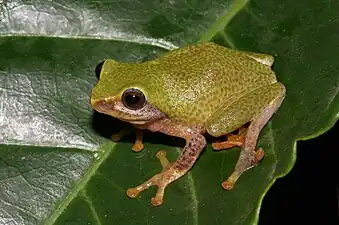| Raorchestes glandulosus | |
|---|---|
 | |
| Scientific classification | |
| Domain: | Eukaryota |
| Kingdom: | Animalia |
| Phylum: | Chordata |
| Class: | Amphibia |
| Order: | Anura |
| Family: | Rhacophoridae |
| Genus: | Raorchestes |
| Species: | R. glandulosus |
| Binomial name | |
| Raorchestes glandulosus (Jerdon, 1853) | |
| Synonyms[2] | |
| |
Raorchestes glandulosus, also known as glandular bush frog, rough-skinned bush frog, southern bubble-nest frog, and with many other names, is a species of frog in the family Rhacophoridae. It is endemic to the Western Ghats, India, and known from the states of Karnataka and Kerala.[2][3]
Description
The distinguishing feature of this species, at least among the Raorchestes from the Western Ghats, is its yellow dorsal surface of the forearm and the loreal region. Raorchestes glandulosus are small frogs. Males are 22–27 mm (0.87–1.06 in) in snout-vent length. Among the generally small Raorchestes, this makes them medium-sized. The holotype, now lost, was about 31 mm (1.2 in). The snout is pointed. The dorsum is shagreened. The lateral abdominal area is prominently glandular (hence the specific name glandulosus). Dorsal coloration varies between individuals and environmental conditions between dark green to dark purple or violet. The sides, forelimbs, and the loreal and tympanic regions are yellow. The ventrum is yellow to light yellow.[3]
Habitat
Raorchestes glandulosus has been observed as high as 2000 meters above sea level.[2][4] It is an arboreal species, usually found higher that 4 metres above the ground. It can be found within rainforest but also disturbed habitats such as forest fringes near coffee plantations and gardens.[3] Raorchestes glandulosus is threatened by habitat loss.[1]
References
- 1 2 S.D. Biju, S. Bhupathy, Gajanan Dasaramji Bhuddhe, Bexel Ayyasamy Daniel, Sushil Dutta, S.P. Vijayakumar, Karthikeyan Vasudevan (2004). "Raorchestes glandulosus". IUCN Red List of Threatened Species. 2004: e.T58847A11849180. doi:10.2305/IUCN.UK.2004.RLTS.T58847A11849180.en. Retrieved 17 November 2021.
{{cite journal}}: CS1 maint: multiple names: authors list (link) - 1 2 3 Frost, Darrel R. (2019). "Raorchestes glandulosus (Jerdon, 1853)". Amphibian Species of the World: an Online Reference. Version 6.0. American Museum of Natural History. Retrieved 29 November 2019.
- 1 2 3 Biju, S. D. & Bossuyt, Franky (2009). "Systematics and phylogeny of Philautus Gistel, 1848 (Anura, Rhacophoridae) in the Western Ghats of India, with descriptions of 12 new species". Zoological Journal of the Linnean Society. 155 (2): 374–444. doi:10.1111/j.1096-3642.2008.00466.x.
- ↑ "Raorchestes glandulosus (Jerdon, 1853)". AmphibiaWeb. University of California, Berkeley. Retrieved 31 July 2023.
External links
 Data related to Raorchestes glandulosus at Wikispecies
Data related to Raorchestes glandulosus at Wikispecies
